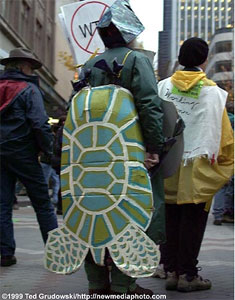Part 5: Those
Who Argue Against the WTO
There are plenty of criticisms of the WTO. Some of them
are critiques of the theory of free trade for which the
WTO stands, and some are critiques of the way the WTO
actually works. In general, critics of the free trade
argument suggest that the theory of free trade is all
wrong: in order for free trade theory to work, they say,
all economies must be at full employment, and the price
mechanism must work perfectly and instantaneously to adjust
supply to demand. In the absence of those conditions—and
those conditions are indeed typically absent—the
positive outcomes associated with free trade theory simply
do not hold.
|
| Parody of a Nike ad to protest
the WTO conference in Seattle in 1999. Original source:
Indymedia, which advertises itself as “a collective
of independent media organizations and hundreds of
journalists offering grassroots, non-corporate coverage.
Indymedia is a democratic media outlet for the creation
of radical, accurate, and passionate tellings of truth.”
http://www.indymedia.org/en/index.shtml ] |
 |
| Protester at the 1999 Seattle WTO
conference worried about the environmental impact
on wildlife. |
Most criticisms of the
WTO, however, are more specific. They relate to the way
it deals with particular issues: animals, the environment,
developing countries, poverty, corporate power, political
representation. Moreover, they dispute whether the WTO
actually operates and makes decisions by its governing
rules. They argue, for example, that although the WTO
says that any country can refuse to trade in any good
if its production threatens animal species or the environment,
or if it is produced with labor conditions objectionable
to a country in question, the way the WTO actually operates
makes such arguments impossible to sustain in a real dispute.
You might find that such
criticisms are the mirror image of those in favor of the
WTO. Whereas the latter are a theory in search of facts
to support it, the former seem more like facts in search
of a theory of economic processes. The question, then,
is how can the WTO be reformed? Or should it be? Should
it just be tossed out?
WEBLINKS:
Explore these weblinks for criticisms of the WTO.
Ten Criticisms of the WTO and (the WTO’s Rebuttal)
http://www.wto.org/english/thewto_e/whatis_e/10mis_e/10m00_e.htm
Greenpeace, “Why is the WTO a Problem?”
http://www.greenpeace.org/international_en/campaigns/intro?campaign_id=4003
Animal Rights Activists: Humane Society of the United
States, “The WTO”
http://www.hsus.org/ace/11657
AFL-CIO, “What is the WTO?”
http://www.aflcio.org/issuespolitics/globaleconomy/whatis.cfm
Public Citizen Global Trade Watch, “The WTO”
http://www.citizen.org/trade/wto/


